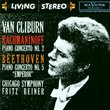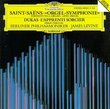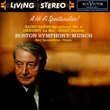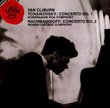| All Artists: Dmitry Shostakovich, Leonard Bernstein, New York Philharmonic Title: Shostakovich: Symphonies Nos. 5 & 9 Members Wishing: 0 Total Copies: 0 Label: Sony Release Date: 9/14/1999 Genre: Classical Styles: Historical Periods, Modern, 20th, & 21st Century, Symphonies Number of Discs: 1 SwapaCD Credits: 1 UPC: 074646184127 |
Search - Dmitry Shostakovich, Leonard Bernstein, New York Philharmonic :: Shostakovich: Symphonies Nos. 5 & 9
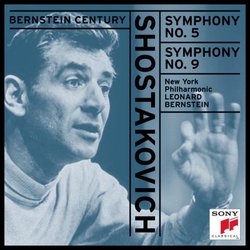 | Dmitry Shostakovich, Leonard Bernstein, New York Philharmonic Shostakovich: Symphonies Nos. 5 & 9 Genre: Classical
Leonard Bernstein's performances of Shostakovich were almost as highly regarded as his Mahler. This performance of the Fifth Symphony was the highlight of his celebrated tour of the Soviet Union with the New York Philharm... more » |
Larger Image |
CD DetailsSynopsis
Amazon.com essential recording Leonard Bernstein's performances of Shostakovich were almost as highly regarded as his Mahler. This performance of the Fifth Symphony was the highlight of his celebrated tour of the Soviet Union with the New York Philharmonic in 1959. The composer himself attended the performances and approved of Bernstein's interpretation, which is the exact opposite of the traditional Russian one. Rather than take the finale ponderously, Bernstein flies through the music at a frantic pace, carrying it forward with irresistible momentum. The Ninth Symphony is the composer's lightest and most carefree. Bernstein walks the fine line between humor and seriousness with acrobatic skill. --David Hurwitz Similarly Requested CDs
|
CD ReviewsBrilliantly Headstrong D. J. Zabriskie | Park Ridge, NJ USA | 04/22/2005 (4 out of 5 stars) "Recorded immediately after the New York Philharmonic's triumphal tour of the Soviet Union in 1959, this remains the most controversial recording of this symphony extant. Bernstein eschews the sarcastic wit and self-satire that Shostakovich wrote into the score for an emotionalism that is so compelling, it just carries you along with it... even when you are questioning his choices. The young Leonard Bernstein had three very different and very contradictory influences as a conductor. From Dimitri Mitropoulos he got a sense of music as drama, a contiunal ebb and flow of tension. From Serge Koussevitzky he inherited a deep-rooted feeling for the poetry of music. From Fritz Reiner he learned a classical rigor and and a comprehensive knowledge of the score. Bernstein did not so much combine these influences as he sythesized them into a style all his own, marked by a broad dynamic pallette, stark shifts of tempi, and an emotional content that few other conductors could match. At his best, Bernstein produced moments where he seemed to disappear from the podium and channel the composer directly. At others, he could be almost perversely headstrong, as he is here... but in this case, BRILLIANTLY so. At the core of Lenny's reading of the Shostakovich Fifth is a sense of this music's celebration of the heroism of the Russian people. Whether that is an expression of their heroism in triumphing over Hitler, or surviving Stalin, or their belief in Marx is not clear. At any event, this is the most "heroic" performance of this symphony you will ever hear, and as such it stands out. Bernstein's approach to this music owes a lot to the Mitropoulos version (which has better orchestral balances and more striking detail), but differs from it in significant ways. First of all, Lenny's tempi in the 2nd and 4th movements are noticeably quicker. This makes the scherzo a riot of drunken excess, sort of like Fyodor Karamazov set to music, but also imparts a real sense of impending danger to the music. The finale is taken at almost twice the pace that Shostakovich indicated in the score, replacing the composer's mashochistic satire with a sense of the heroism of triumph through endurance. Shostakovich himself expressed his pleasure (not the same as his approval) of this unorthodox approach after a live performance in Moscow by the NYPO. In short, Lenny's version of the Shostakovich 5th may be totally wrong-headed, but it is so brilliant and compelling in its vision, however headstrong it may be, that you cannot deny its power. This will move you as few other performances of this symphony can." Essential D. J. Zabriskie | 07/10/2000 (5 out of 5 stars) "Whatever you may think of Bernstein's interpretations of this or any other composer, you have to hear this disc. The slow movement of #5 is absolutely stunning- you will, as the audience was, be afraid to draw a single breath for fear of disturbing the rapturous aguish filling the hall. Bernstein and his orchestra fully plumb the depths of poigniant sadness inherent in this (and so much of Shostakovich's music). This is one of those times that unannealed magic was caught on a recording. Don't go one more day without this recording." New York saves Bernstein tompy0904 | Florida | 01/14/2006 (2 out of 5 stars) "I am not here to dispute the great talent of the all-American musical hero Leonard Bernstein. A man far above the rest as far as skill and attention to detail is concerned but as for this recording there are many dissapointing aspects of the interpretation. The Ninth is done quite well. Although it does feel slightly bland and downright boring at times, I attribute this to my own personal preference. The orchestra performs superbly and Bernstein is in his element amongst this famed group of musicians. All in all, this is a solid recording of the Ninth.
It is the Fifth that completely turned me off to this recording. The interpretation was completely headstrong (a Bernstein-ian trait that is very well done in some works but goes way overboard in this Symphony) and at times careless. The tempos that Bernstein employs are much too fast and tend to waver slightly. For instance, the second movt. of the Fifth is a driving introduction introduced by low strings. At the outset, it is much too fast. As the theme is introduced a little later on, the speed is such that the orchestra cannot execute the passages cleanly and this creates a jumble of muddy orchestral sound not up to N.Y. Phil. standards. At the end of this passage, just before the entrance of the horns, there is an anticlimatic fall in the sound. As the bones and tuba have the descending line there is almost a decresendo in the sound rather than a building. This makes the entrance for horns sound quite out of place and overblown. The other movts. tend to fare slightly better, all except the last. While I do like the driving, intimidating tempo of the opening very much, there isn't much else musically that is appealing. The orchestra continues to play beautifully under the somewhat healed interpretation that Bernstein has gained since previous movts. But just when the music becomes its most enthralling, it seems that Lenny gets bored. The final chords of dissonance (the ones thought to represent the screams of Stalin's victims underneath a false hope and happiness) are bowled over. There is no feeling or passion invoked, just the notes on the page. Over all, I was quite dissapointed in the interpretation. The playing was good, if not up to the standards that are the Phil. For me, the orchestra was what shined in this recording, not Bernstein. I'm not knocking Lenny. I have many amazing recordings of his other works that are beautiful and full of soul and passion. This one lacks in that respect. If you are looking for a wonderful interpretation of the Fifth, pick up LSO's live recording with Rostropovich. Amazing and right on the money, in my opinion." |

 Track Listings (9) - Disc #1
Track Listings (9) - Disc #1
